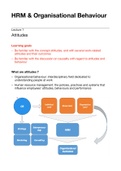HRM & Organisational Behaviour
Lecture 1
Attitudes
Learning goals
- Be familiar with the concept attitudes, and with several work-related
attitudes and their outcomes
- Be familiar with the discussion on causality with regard to attitudes and
behaviour
What are attitudes ?
- Organisational behaviour: interdisciplinary eld dedicated to
understanding people at work
- Human resource management: the policies, practices and systems that
in uence employees’ attitudes, behaviours and performance
fl fi
,Why study attitudes ?
- Attitudes are an important predictor of behaviour
- Generating positive attitudes increases desired behaviours such as
performance, health and OCB
- Generating positive attitudes decreases undesired behaviours such as
absenteeism and turnover
What are attitudes ?
- Attitudes are evaluative statements or judgements concerning objects,
people, events or ideas
- Attitudes are learned predispositions to respond in a consistently
favourable or unfavourable manner with respect to an attitude object
- Attitudes vary in complexity (taste of apple & death penalty)
- Attitudes are an important predictor of organisational behaviour
,Cognitive dissonance
- Unbalance between cognition, a ect and behaviour
- Attitude -> Behaviour
- Behaviour <- Attitude
From behaviour to attitudes (cognitive dissonance theory by Festinger)
ff
, Attitudes & OB (+ increases, - decreases)
- Satisfaction = positive job evaluation (+ performance & OCB, -
absenteeism, turnover & deviance)
- Involvement = identi cation & participation with job (+ performance &
OCB, - absenteeism & turnover)
- Commitment = identi cation with goals + membership (+ performance &
OCB, absenteeism & turnover)
- POS = perception of care & contribution (+ well being, org. Identi cation &
OCB, - N-comm, A-comm & involvement)
- Work engagement = vigor, dedication & absorption (+ performance, OCB
& health, - CWB, absenteeism & turnover)
Shortcuts:
1. OCB - organisational citizenship behaviour
2. CWB - counterproductive work behaviour
3. POS - perceived organisational support
Lecture 2
Personality & Diversity
Learning goals
- Be familiar with the concepts of personality (the big 5 personality theory,
proactive personality theory, dark triad personality)
- Be aware of the debate surrounding managing diversity, and its potential
and challenges (e.g. stereotypes)
Why study personality ?
- Personality traits predict many HR/OB related outcomes, such as
performance, career success, promotions
- Personality is an important selection criterion
fifi fi





